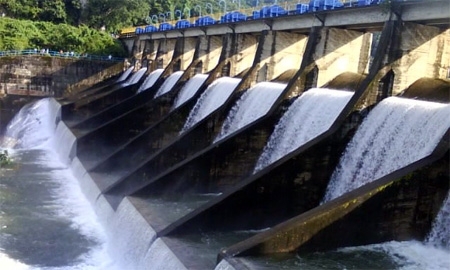Security and sustainability of both power and water supplies are issues that the Government has actively been addressing. The country’s domestic energy landscape has changed significantly in the past decade from being an energy-rich country to one that may soon need to rely on imports to meet its growing demand and burgeoning economy.
After concentrated efforts to develop its petroleum industry in the 1970s, and major discoveries throughout the following two decades, Malaysia became a significant producer and net exporter of petroleum products. The country’s national petroleum company, Petronas, has been overseeing the sector since its incorporation in 1974. Although Malaysia also has a well-developed gas supply infrastructure, gas reserves are estimated at just 88 trillion cubic feet. Indeed, gas production is now declining by 10 per cent annually and the country is reliant on imports for 25 per cent of its supply.
Another major source of energy in Malaysia is coal. The country has deposits in Sabah and Sarawak, but again, only a small percentage of local coal is being mined due to remoteness and quality factors, and Malaysia imports a significant percentage of its supply for power generation. Both hydro and alternative sources of energy, especially biomass, biogas and solar, hold potential for the future. Although the alternative energy sector in Malaysia will still take some time to reach fruition, the country does have a significant hydropower sector, and there is still room for new mini and micro hydropower projects.
Consequently, Malaysia is expected to become a net importer of energy by 2019, especially given projections in energy consumption growth.
THE NATION’S FLOURISHING ECONOMY HAS GREATLY INCREASED DEMAND FOR ENERGY OVER THE PAST DECADE AND CHANGED ITS ENERGY LANDSCAPE SUBSTANTIALLY;
MALAYSIA IS EXPECTED TO BECOME A NET IMPORTER OF ENERGY BY 2019 |
Compounding the complexity of Malaysia’s power sector are the country’s systems of subsidies and tariffs. While petroleum products are linked to market prices, gas prices and electricity tariffs are regulated by the Government. The capping of gas prices below market levels, for example, has led to a surge in demand, especially for industrial use.
Charged with overseeing this complex situation and ensuring sufficient power supply for Malaysia’s growing demand is Ahmad Fauzi Hassan, CEO of the Energy Commission, the Government body responsible for regulating the sector, and in particular electricity and piped-gas supply.
Created in 2001 as part of Government efforts to increase the efficiency of utility services and in anticipation of industry deregulation, the Energy Commission aims to balance the needs of consumers and providers of energy to ensure safe and reliable supply at reasonable prices, while fostering economic development and competitive markets in an environmentally sustainable manner.
Responsible for the equally challenging task of ensuring sufficient clean water supply for the nation is Dato’ Teo Yen Hua, CEO of SPAN, the National Water Services Commission. Appointed as CEO in 2007, Mr Teo had previously served in the Malaysian civil service for 32 years, holding positions in the Treasury, the Ministry of International Trade and Industry, Ministry of Primary Industries and Ministry of Education before being posted to Ministry of Energy, Communications and Multimedia in 2000.
As head of the agency responsible for regulating the nation’s water supply, Mr Teo has worked to increase efforts towards improving the operational efficiency of the industry and the reduction of non-revenue water.
Tasked with ensuring the long-term availability and sustainability of water supply, as well as its conservation, SPAN works to optimise the productivity of the water supply and wastewater services industry by monitoring operator compliance with quality standards and through continued capital works development.

0 COMMENTS